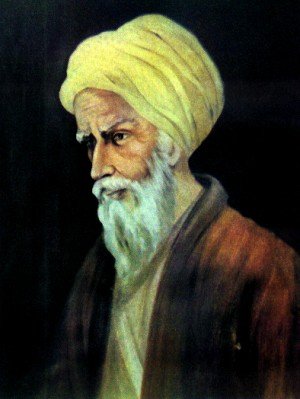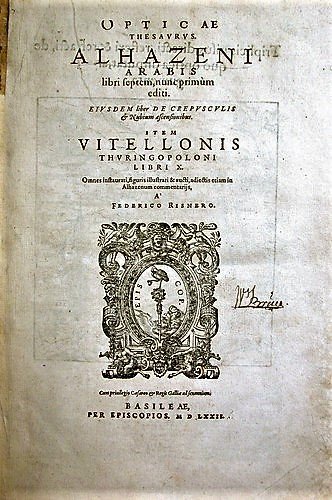Ibn al-Haytham - the first scientist
This is a companion piece to Ham - the first space pilot.
The Scientific Method
Without a doubt, the greatest misunderstanding in today's world is the term "Science".
Science is NOT
- What you read in the magazine.
- What you or anyone "believes".
- What a scientist buddy told you.
- What a single research paper says.
- Anything preceded by "Science says..."
- Anything claimed to be a "fact".
The scientific method is a rigorous and evolving way of learning how our Universe and everything within it works. It is driven by empirical evidence subject to rational reasoning that is thoroughly peer-reviewed, tested and revised. Forever.
A theory is not some idea you cooked up in the shower. That would be a conjecture at best. You build a hypothesis based on your idea, predict outcomes of experiment. After rigorous testing by scientists worldwide over an undetermined period of time, if your predictions manage to be right 99.99999% (Six sigma) of the time, you get to call it a Theory. There are very few theories at this time - there's a lot of work to be done.
Science doesn't care about what you think or what you believe. The empirical evidence is unwavering and indisputable.
Needless to say, the scientific method is an endless loop of improvement. A theory is never done, and is never the ultimate end-all of anything. There may just be a better theory in the future. One that doesn't invalidate an existing theory, but simply offers a more complete version.
Alhazen

When it comes to scientists, a few names are household staples. Euclid, Ptolemy, Galileo, Darwin Newton, Einstein et al - you've heard about them all. Curiously, Ibn al-Haytham often gets sidelined in the history books. Latinised as Alhazen (what a cool name!) it was Ibn al-Haytham who first documented the world-changing idea that hypotheses must be rigorously proved by repeatable experiments and observations. Alhazen questioned his predecessors and all accepted ideas - including Ptolemy's.
By extension, Alhazen may be the world's first theoretical physicist. His works touched upon optics, mechanics, astronomy, mathematics, engineering, philosophy and even theology! A true renaissance man, if there ever was one. Even is writing style was revolutionary - clear, easy and concise; he strove to share his knowledge with the public as elegantly as possible.
Kitab al-Manazir

Perhaps Alhazen's magnum opus was Book of Optics. At the time, it was widely believed that eyes worked by emitting rays of light, kind of like an invisible torch. Animals' glowing eyes was said to be "evidence" for the same, after all. Aristotle had a better idea, but Alhazen got it absolutely spot on. Book of Optics was a defining point in the history of science which ultimately resulted in the use of telescopes and a birth of a whole new branch - astronomy.
Speaking of which, he cast serious doubt on Ptolemy's planetary model - widely accepted for nearly a millennium at the time, in the book aptly titled "Doubts Concerning Ptolemy". Of course, he didn't have the tools to experiment - but Galileo did half a millennium later.
Finally, the idea that a body continues to move till a force is acted upon it - guess who thought about that first? Yes, a full seven hundred years before Newton!
Science goes West
Alhazen accomplished all of this between 965 and 1040 AD. At the time, Europe was recovering, by the skin of its teeth, from the Dark Ages.
Yet, it could have been much, much more. The Islamic Golden Age was on the brink of leading to a Scientific revolution a full 400 years earlier than their European counterparts. Alas, invasions and the crazed Islamic philosopher Al Ghazani who drove cultural sentiment away from rationality towards mysticism, meant it came to a grinding halt.
Luckily, a few centuries later, European scientists learned of the progress made by Alhazen and his contemporaries. Eventually, the scientific method was the vital ingredient that sparked off the greatest in revolution in human history - the Scientific revolution in the 16th century. The human civilization would never be the same, although it could have happened a lot earlier.
Ibn al-Haytham was one of the greatest men to have ever lived, whose contributions had an enormous impact on the world. His legacy must be promoted in every history book alongside popular names like Newton or Einstein.
Further reading -
http://islamsci.mcgill.ca/RASI/BEA/Ibn_al-Haytham_BEA.htm
http://www.ibnalhaytham.com/
http://news.bbc.co.uk/2/hi/science/nature/7810846.stm
https://en.wikipedia.org/wiki/Ibn_al-Haytham
http://micro.magnet.fsu.edu/optics/timeline/people/alhazen.html
https://books.google.co.in/books?id=cSK6g_9jclQC&pg=PA39&redir_esc=y#v=onepage&q&f=false
All images in the public domain.
Another interesting thing is that the Muslims were very tolerant of people of other faiths during this time. I find it also interesting how tolerant environments tend to be the wellspring of innovation and advancement of knowledge and culture. Sadly, things go in cycles and the Muslim world today is not nearly as tolerant and it is thus not the wellspring of science it once was. Perhaps if tolerance ever shines in the hearts and minds of such people again that can once again change. This is also not only true of just the Muslims. All organized religions that have been around very long have had moments of intolerance.
He was also not a lone Muslim intellect. During this period of tolerance they were perhaps the most educated of all the peoples in the Western civilizations. They were even ahead of many of the eastern civilizations.
You're certainly right, the Arab world during the Islamic Golden Age was probably hundreds of years ahead of its time. Europe wouldn't see this kind of revolution till the Renaissance, at least, but even then concepts such as freedom of speech or complete patronage of scholars are things we still struggle with today. It's hard to know to what extent there actually was freedom of speech, but it's fair to say the rest of the world was far behind. Like I mentioned in the comments earlier, at the same time the Pope was preparing the Crusades - pretty much the epitome of intolerance. Regardless, this is a topic for another thread :)
the Muslim world today is not nearly as tolerant
Or perhaps the western world wanna make you believe so again ;) But I do completely agree with what you said. A golden era was lost due to complacency, losing connection with the inspiration and corruption et al.
I don't consume mainstream media or even a single source, so that is not where I'm getting my news. I tend to try to go wide with news, and research.
There are tolerant people in the muslim religion, just as there typically are in all religions. Yet, there are a growing number of ignorant members that are not tolerant. It could be argued they are not true muslims, yet they choose the label. Whether a person is "true" any religion is easily debateable.
A very underrated scientist unfortunately. He's an important part of scientific history.
Another relevant link: https://historyofphilosophy.net/vision
I highly recommend the History of Philosophy podcast in general, too.
Thanks for sharing it! I'll check out the podcast.
This is very interesting. Have you heard of the very first cat scientist though? https://en.wikipedia.org/wiki/F.D.C._Willard
Ah, I learned about Chester earlier this month, when I was researching for my article about Ham. Deserves its own post, I'd say. Care to write one? :)
And I didn't know about Ham - I thought that https://en.wikipedia.org/wiki/Laika was the first space animal! Sure, I'd gladly post about Chester althought a cat doesn't fully support the idea of my profile :P Cats are friends though!
I invite you to read about chester on my profile then soon. :)
Laika was the first space animal, but didn't actually interact with the vessel.
C'mon, cats and dogs can get along just fine!
Alhazen accomplished all of this between 965 and 1040 AD... unreal!
Meanwhile, William the Conqueror had entirely more violent plans, the Vikings were pillaging northern Europe, the Byzantines were wreaking havoc, the Holy Roman Empire ruled much of Europe by force, while the Pope was preparing the Crusades.
Back in the Arab world... Golden age.
Wow.
Ibn al-Haytham who first documented the world-changing idea that hypotheses must be rigorously proved by repeatable experiments and observations. Alhazen questioned his predecessors and all accepted ideas - including Ptolemy's.New knowledge to me. Very nice article.
Resteemed.
Yes, this is something everyone should know; yet Alhazen is sidelined in the history books.
Cos its normal for the west to try to lay claim to being the (only) source of the modern civilization :)
Haha, I was waiting for someone to say that out loud :)
Tesla is my favorite scientist. He is Croatian, Serbian and American AND he invented electricity!
Tesla didn't invent electricity by any means. It was discovered and documented by the Greeks thousands of years ago. Of course, they didn't know how to produce it. That was done largely by Michael Faraday a century before Tesla.
Tesla didn't even invent AC - that was done by three Hungarian scientists. Indeed, he didn't even invent the induction motor independently! And the three phase electricity we use today was developed by other people.
In short, Tesla is wildly overrated and misunderstood for having done things he never did. He was a phenomenal figure alright, but frankly not a very good scientist.
Were it not for Edison, no one would even know about Tesla.
Wow to be honest i didn't know that! valuable information but i must say somehow Tesla discovered something that got him killed, have you heard about "The Free Energy" ?!
I do want to add a caveat to this.... I thought about it after awhile.
"First scientist..." as far as we know.
A lot of historical knowledge has been lost and destroyed. The library of Alexandria was destroyed way before this...
The works of Plato for example that we have are supposedly but a fraction of his actual works.
Then we have things like...
Antikythera Mechanism
Which make us get a glimpse of how many things from the past WE DON'T know. Many of these seem like they would take a scientific mind to achieve.
With book burnings, building destruction, councils meeting to decide the truth, and censoring those they decide not to keep... who actually was the first scientist is actually a huge mystery.
So I'd call him the "earliest currently known scientist" and he was a bad ass...
But there are so many mysterious things out there being discovered about the past.
I consider the loss of the library of Alexandria to potentially be one of the worst disasters in history.
thank you for sharing this precious info which no one cares about.
Sadly, you may be right. I believe it is important to understand history and learn from it. Pretty much every mistake a human being has ever made has precedence in history.
an interesting article that we should read it. this is good article. :)